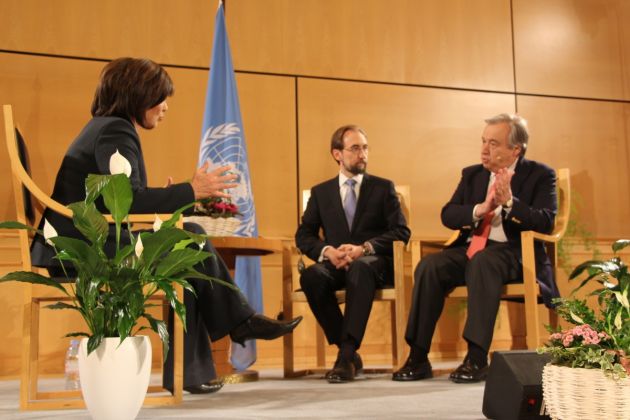UN Security Council accused of 'failing victims' in Syria

GENEVA - U. N. agency heads and a global coalition of aid and church-backed groups have accused international powers of failing the victims of the Syrian conflict, asking what needs to be done to end the war.
"The appalling crisis in Syria is entering a fifth year," said the UN group March 13. They noted it is "A crisis that continues to exact an unconscionable human cost; a crisis that the international community has failed to stop."
The signers of the U.N. statement include the Office for the Coordination of Humanitarian Affairs, the World Health Organization, the World Food Program, the High Commissioner for Refugees, the head of United Nations Relief and Works Agency, UNICEF and the Special Representative on Children and Armed Conflict.
They said more than 200,000 people have been killed in the conflict.
"Children and young people are subject to and surrounded by violence, despair and deprivation. Women and girls, and men and boys in detention, are at particular risk of sexual violence."
Of Syria's 22 million people more than 12.2 million in the country need life-saving aid and 3.9 million refugees have fled across borders to seek safety and security.
The day before, the Failing Syria Report was released by aid agencies, including Save the Children, Pax Christi International, Norwegian Church Aid, World Vision International and Oxfam.
The report said the 15-member Security Council had not fulfilled pledges to increase aid access and alleviate suffering.
"This spiralling catastrophe is a stain on the conscience of the international community.
"The resolutions passed by the UNSC provide a framework to end the suffering in the short and longer term, and the parties to the conflict are under an obligation to implement them.
"While the UNSC has the legal authority to demand these changes, its members and their allies have the political, diplomatic and financial influence, and the ability, to ensure these changes actually happen."
SUPER POWERS' STUMBLING BLOCK
The main stumbling block is an inability for the super powers in the Security Council to clinch agreement.
Russia, backed by China, has used its veto power to block council resolutions that condemn President Bashar al-Assad Assad's government and threaten it with sanctions.
Assad's government along with Russia blames the rebels for the civil war.
"The violence in Syria continues to be fuelled by transfers of arms, ammunition and other forms of military support from regional and international powers. Over 90 percent of the arms in Syria were manufactured in countries that are permanent members of the UNSC, particularly Russia," the NGOs report said.
"The USA has transferred arms and ammunition to armed opposition groups and France has expressed its willingness to do so. In addition, there is a continuing flow of ammunition and heavier munitions from Iran to the Government of Syria, and from Gulf States to various armed opposition groups."
Among its recommendations the report said the UNSC and its members should take immediate steps to hold accountable all parties to the conflict for breaches of international law.
In particular it should ensure there is full accountability for war crimes and other serious human rights violations to counter impunity and help deter future violations.
The U.N. High Commissioner for Human Rights Zeid Ra'ad al-Hussein said on March 12 that with growing evidence those accused of war crimes in Syria will someday face justice for gross violations against civilians.
"We have a massive amount of evidence, there are lists with people's names on them," Zeid told CNN's Christiane Amanpour before an audience in Geneva during a joint interview with U.N. refugee chief Antonio Guterres.
"Justice will be done, it may not be immediate, but hopefully as we go through the transition from total impunity to justice being realized, we will honor the victims and the kin of the victims."
Zeit was speaking at a yearly event to commemorate the late U.N. Iraq envoy Sergio Vieira de Mello who was killed in a Baghdad bomb explosion that killed 20 others. The attack was carried out in August 2003, by the predecessors of the group that calls itself Islamic State.